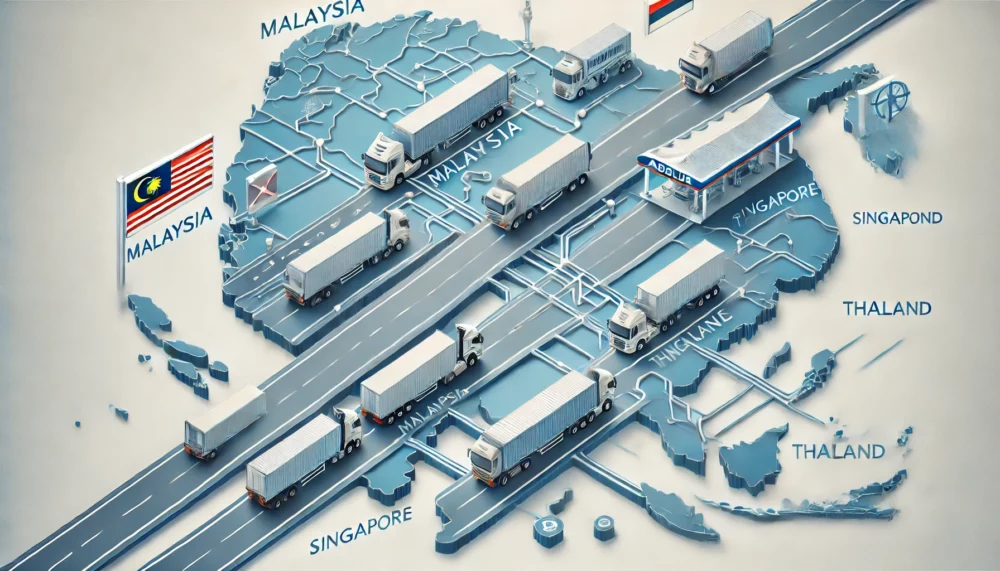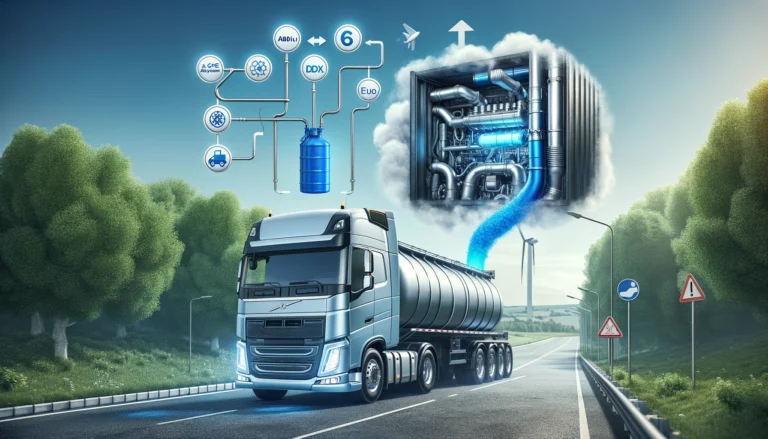In Southeast Asia, trucking routes play a vital role in trade, connecting countries and helping goods move smoothly across borders. Malaysia, because of its central location, acts as a key link between Singapore in the south and Thailand in the north.
This article highlights the main trucking routes that pass through Malaysia, Singapore, and Thailand, and explains how AdBlue® helps keep trucks running efficiently along these important routes.
It’s essential to have AdBlue® available at key spots to ensure that trucks can operate without interruptions and stay environmentally friendly.
Major Trucking Routes Revisited
The trucking routes across Malaysia, Singapore, and Thailand are crucial to regional trade, linking major ports with industrial zones and cities.
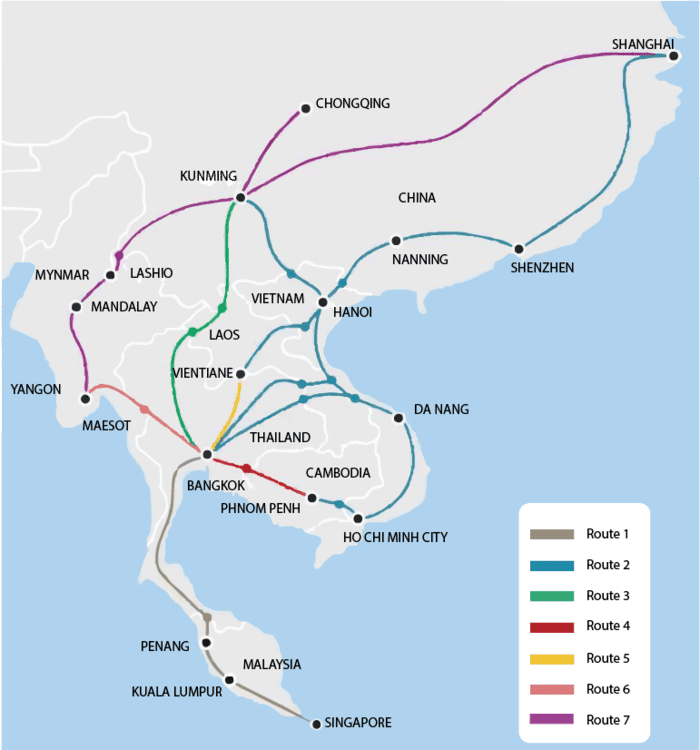
These routes do not only serve the movement of goods within Malaysia, but they also play a vital role in cross-border trade with Singapore and Thailand.
These areas are crossed by long-haul routes (an artery of commerce from manufacturing, agriculture, and others to the wholesale) which must remain open for products getting to their foreseen users.
Prominent Routes and Distances
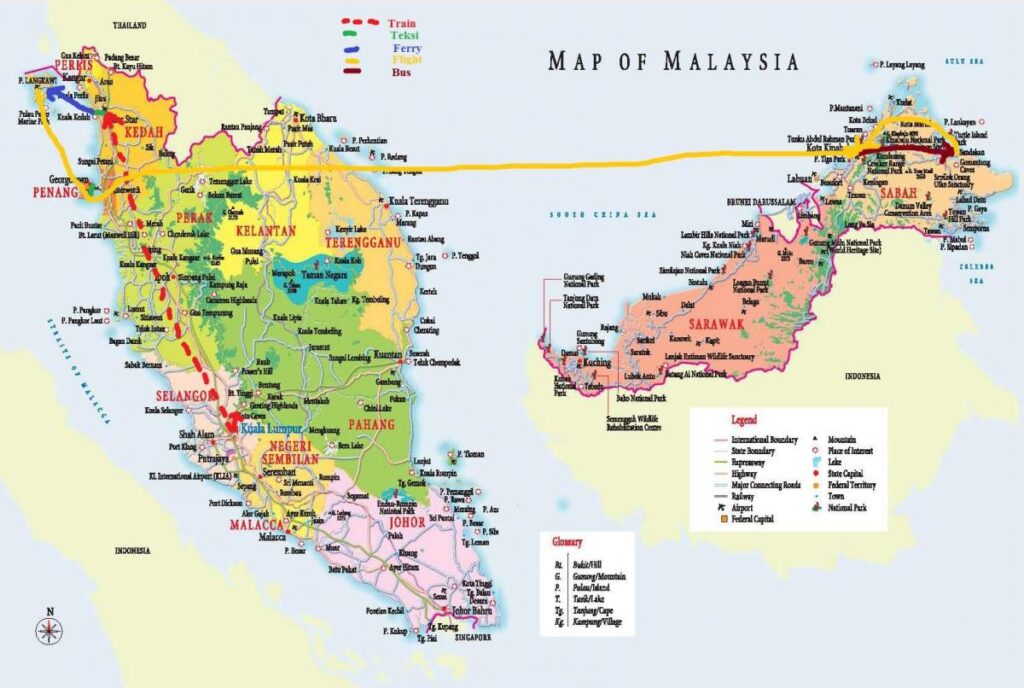
Kuala Lumpur to Penang
If we are traveling in Malaysia, one of the most popular routes you will see everyone taking is from Kuala Lumpur [KL] to Penang. It uses the North-South Highway (E1) and travels along the west coast of Peninsular Malaysia.
Kuala Lumpur-Penang is a 360-km key logistics route linking the central region and the northern states.
Port Klang to Johor Bahru and Other Website Ports
As one of the most important Malaysian ports and located only 70 km away from Kuala Lumpur, Port Klang is an essential regional logistics hub.
The 400-kilometer route between Port Klang and Johor Bahru is a critical port-to-port connection — especially for goods bound to Singapore or other areas of Malaysia.
The North-South Highway is the key link in this journey, providing smooth connectivity between these primary ports. Routes that connect Port Klang to other major ports such as Melaka and Penang are equally essential in promoting maritime-road transport integration.
Cameron Highlands to Singapore
Cameron Highlands — a highland resort area in Pahang, all the way to Singapore: Another popular long-haul route is from Cameron Highlands. The 500-kilometer trip runs along Route 4 (the East-West Highway) and then heads into the North-South Highway.
A key pathway enabling agricultural products, in particular foodstuffs that need to be rushed to Singaporean markets on time, the highway is also one of two bridges that connect Malaysia’s mainland with its Peninsular island.
North-South Highway
PLUS Expressways: North-South Highway, the backbone of Malaysia’s road transportation empowerment, is one of Malaysia’s oldest expressways that spans over 800 kilometers from the Thai border in the north to Johor Bahru in the south, touching all major cities and ports along the Malaysian west coast on Peninsular.
This is a critical corridor for long-haul distribution, construed as it offers seamless drive along vital industrial and commercial conduits.
It is critical to have AdBlue® available along this highway in order for the trucks that use it to meet emission standards and work at their most efficient.
Penang to Pahang Highway
The Penang to Pahang Highway that links the west coast with the east is a vital artery for goods-moving through Malaysia. The road is very important for the eastern states of Pahang, Terengganu, and Kelantan as they will be connected to ports and markets on the west coast.
It is crucial to keep trucks still shifting goods daily up and over the mountainous terrain of the central peninsula, making their availability due paramount along this route!
Major Ports
Port Klang
Port Klang is the main gateway by sea into Malaysia; it encompasses Southport, Northport, and Westports as its three major ports. Port Klang is Malaysia’s largest cargo port and the primary gateway for country trade, handling a vast volume of cargo essential to global supply chains in Southeast Asia.
The services linking Port Klang to other towns and cities in the rest of Malaysia—and as well to Singapore, across the Strait (to its south), and Thailand otherwise—play a vital role in facilitating trade.
The introduction of AdBlue® at Port Klang ensures that emission regulations are all complied with and assists in implementing sustainable logistics practices by enabling trucks operating in and out from the busy port to have access to this product.
Johor Bahru (JB) Port
Other important sea ports are the Port of Johor Bahru, which is a major cargo shipping terminal along with other smaller terminals; conducted mainly for cross-border trade between Malaysia and Singapore.
JB Port is right across the causeway from Singapore and plays a critical role in terms of importing and exporting goods between Malaysia – so striving harder to enhance those capabilities is essential.
Trucking routes to other parts of Malaysia are crucial for enabling regional trade, including those from JB Port on the way to places such as Port Klang and Penang.
This helps keep their trucking fleets efficient and environmentally in line by ensuring the availability of AdBlue® at strategic locations along these routes.
Other Major Ports: Penang and Melaka
Penang Port is a major port in the northwestern part of Peninsular Malaysia; A gateway for trade to and from northern Malaysia, particularly southern Thailand. A crucial corridor for the movement of goods between Penang and key industrial areas in Kedah, Perak as well as to the Thai border.
Also, in Melaka to the southwestern coast: another port crucial for trade along the Strait of Malacca — a highly-trafficked sea passage globally. AdBlue® is the key to enabling optimum operation and clean driving of trucks at these ports, and along trucking routes servicing them.
East Malaysia: Major Routes and Ports
Apart from Peninsular Malaysia’s routes and ports, East Malaysia (with Sabah state) also has a huge trucking route as well as agents when entering via Borneo Island.
The Pan Borneo Highway is also a major route that crisscrosses key city centers including Kota Kinabalu, Kuching, and Miri enabling inter-city freight movements.
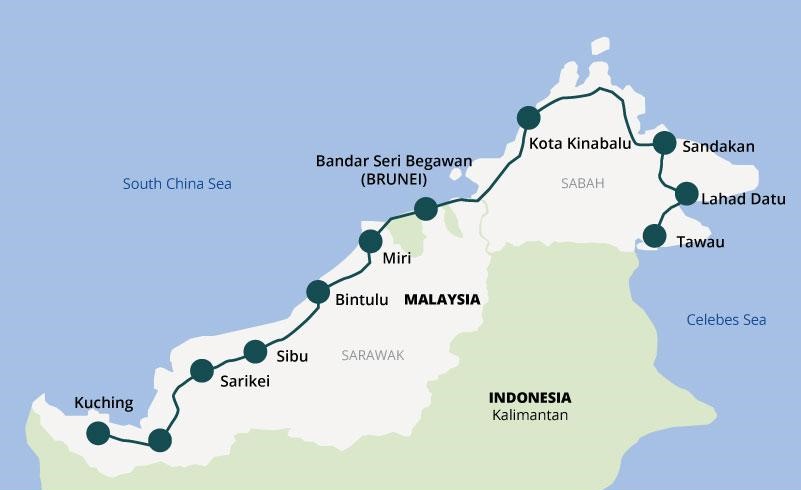
East Malaysia’s ports, including the Sepanggar Bay Container Port in Kota Kinabalu and Bintulu port in Sarawak, are key gateways for regional trade.
By providing AdBlue® in these areas, the efficiency of trucks operating in the demanding terrains of Borneo can be preserved and emissions complied with.
The Environmental Impact of AdBlue® on Southeast Asian Trucking Routes
AdBlue® significantly contributes to reducing the environmental impact of trucking operations. By lowering nitrogen oxide (NOx) emissions, AdBlue® helps to minimize air pollution, which is crucial for improving air quality and meeting international emission standards.
As logistics companies and governments prioritize sustainability, the widespread use of AdBlue® in trucks ensures that the transportation industry continues to support economic growth while reducing its carbon footprint.
Practical Tips for Using AdBlue® on Trucking Routes
For logistics companies operating in Southeast Asia, particularly along critical routes in Malaysia, Singapore, and Thailand, strategic management of AdBlue® supply is essential.
Ensuring that AdBlue® is readily available at key refueling points, such as Port Klang, Johor Bahru, and along the North-South Highway, can prevent delays due to non-compliance with emission standards.
Tips for Efficient Route Management
- Plan Refueling Stops for AdBlue®: Ensure that refueling points along major routes are well-stocked with AdBlue® to avoid interruptions. Strategically place these points at intervals along critical highways, such as the North-South Highway and routes connecting major ports.
- Optimize Routes for Efficiency: Use route management software to reduce unnecessary detours and fuel consumption. By analyzing traffic patterns, road conditions, and weather forecasts, companies can minimize idle time and maximize route efficiency.
- Monitor Emission Compliance: Equip fleets with emission tracking systems to ensure ongoing compliance with environmental standards. This proactive approach can help companies avoid penalties and contribute to greener logistics practices.
By implementing these strategies, logistics companies can not only ensure efficient transportation but also play a crucial role in promoting sustainable trade across Southeast Asia.
Conclusion
Singapore and Malaysia are closely linked through trucking routes, while both countries use Thailand as a gateway to other parts of Southeast Asia.
It is through these corridors that goods traverse from the crowded highways of Peninsular Malaysia to picturesque East Malaysian roads in a bid to ensure that each delivery remains timely and cost-effective.
Every single one of these suggestions requires that AdBlue®, which is a standard treatment for all modern diesel engines in the rest of Asia and throughout Australia, must be available to transport operators at key locations – like Port Klang or along the North-South Highway as well as major ports across Peninsular Malaysia.
In this way, the trucking industry can remain a critical support for our local economy but also make good on its responsibility toward an increasingly sustainable future.

